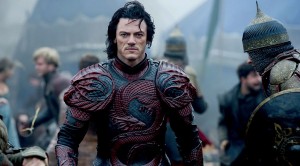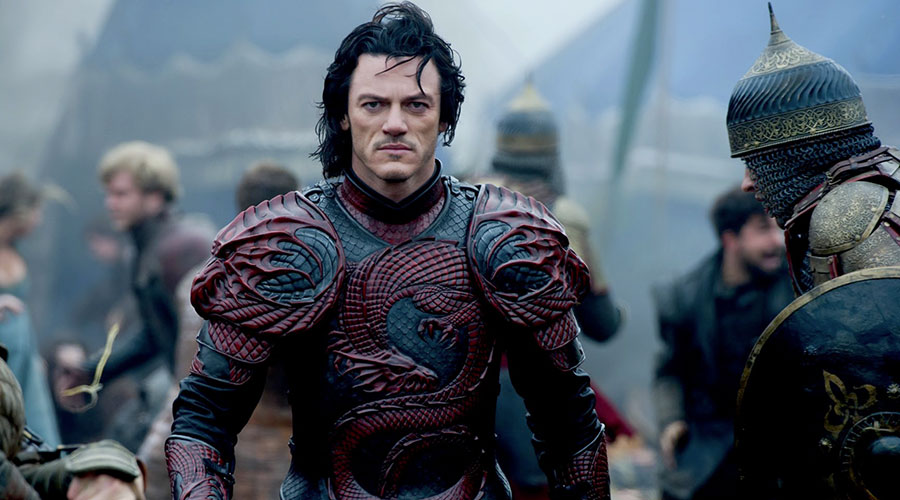Dracula reanimates classic Universal screen monsters
Count Dracula has an image problem that has nothing to do with mirrors.

Prince Charming of Darkness · Luke Evans plays a sympathetic version of Vlad the Impaler fighting for the fate of his people in Gary Shore’s fantasy epic Dracula Untold, opening in theaters this weekend. – Photo courtesy of Universal Studios
Dracula Untold, the action-horror hybrid swooping into theaters this weekend, is the latest attempt to recast Bram Stoker’s deathless creation as a flawed, romantic hero who transforms himself into a tragic monster for the sake of his loved ones. The film, the feature-length debut of director Gary Shore, centers on Prince Vlad Tepes (Luke Evans), better known as Vlad the Impaler, who enters into a Faustian bargain with an undead sorcerer named Caligula (Charles Dance from Game of Thrones, channeling Max Schreck in F.W. Murnau’s original Nosferatu) in order to gain the dark and terrible powers necessary to save his people, especially his young son Ingeras (Art Parkinson, also of Game of Thrones), from being conscripted into the army of the tyrannical Sultan Mehmed II (Dominic Cooper).
Why do so many screenwriters feel the need to retroactively burden classic villains with sympathetic backstories? Are we truly better off knowing that Darth Vader used to be a whiny little control freak who enjoyed waxing poetic about the texture of sand? Did we really need to watch a teenage Hannibal Lecter vengefully embrace the act of cannibalism after Nazi soldiers deceive him into eating the remains of his younger sister in the sadly misguided prequel Hannibal Rising? Part of the reason Heath Ledger’s Joker in The Dark Knight is so terrifying is because there’s simply no accounting for him. We know next to nothing about him, and that makes him seem capable of anything and everything.
Then there’s the matter of general appearances. Compare the noble, hunky visage of Evans’ Dracula to this description of the character from Stoker’s novel, originally published in 1897: “His face was a strong, a very strong, aquiline, with high bridge of the thin nose and peculiarly arched nostrils, with lofty domed forehead, and hair growing scantily round the temples but profusely elsewhere. His eyebrows were very massive, almost meeting over the nose, and with bushy hair that seemed to curl in its own profusion. The mouth, so far as I could see it under the heavy moustache, was fixed and rather cruel-looking, with peculiarly sharp white teeth.” He’s also described as having curved, rotted fingernails and strange patches of hair growing out of his palms.
The Count, who has been portrayed by more actors than any other literary creation, narrowly beating out Sherlock Holmes, is about as far from male-model material as one can get, yet with a few notable exceptions (Christopher Lee’s demonic savage, Klaus Kinski’s mournful ghoul), the vast majority of onscreen Draculas have been handsome, eloquent and supernaturally charming, most of them taking their cues from the legendary Bela Lugosi, who played the vampire king as a smooth, seductive apex predator. The closest we’ve seen to a faithful physical rendition is Gary Oldman’s chalk-skinned, red-robed human leech in Francis Ford Coppola’s Dracula, even though he’s eventually revealed as an age-swapping Casanova searching for the reincarnation of his lost love (Winona Ryder).
Dracula Untold and its humanizing take on the Count wouldn’t be so troubling if the film didn’t also represent the unofficial beginning of Universal’s long-rumored reboot of their Classic Monsters lineup, which is being overseen by Star Trek co-screenwriter Alex Kurtzman, who recently broke with longtime writing partner Roberto Orci, and Fast and Furious 6 scribe Chris Morgan.
In the wake of Disney’s gargantuan success with The Avengers and its other interconnected Marvel properties, nearly every other major Hollywood studio appears to have come down with shared universe fever. Sony has its Spider-Man series building towards director Drew Goddard’s super-villain team-up The Sinister Six (there have also been rumors suggesting the studio is mulling over the possibility of working with Disney so everyone’s favorite wall-crawler can appear in future Avengers sequels, though doing so might hasten Andrew Garfield’s departure from the Peter Parker role), while 20th Century Fox has announced its desire to develop crossover events between its X-Men and Fantastic Four franchises (the currently in-development Deadpool movie would also be in the mix).
Universal, meanwhile, doesn’t have access to a giant roster of superheroes. What it does have, however, is the world’s greatest catalogue of vintage horror movies, all featuring genre heavyweights such as Dracula, Frankenstein’s Monster, his beautiful Bride, the Wolf-Man, the Mummy, the Creature from the Black Lagoon, the Invisible Man, the Hunchback of Notre Dame and the Phantom of the Opera.
A cohesive cinematic universe featuring these horror icons interacting with each other would be rife with creative and monetary potential. In order for Universal’s grand plans to come to fruition, though, Dracula Untold needs to do well in theaters. It’s already pulled down a solid $21 million in select foreign markets (including a stellar $5 million four-day opening in Mexico), but it will have to be a massive hit stateside to make up for its relatively steep $100 million budget.
All this talk of Universal Monsters sharing the screen together can’t help but bring to mind one of the finest horror comedies of all time, Abbott and Costello Meet Frankenstein, where the comedic duo Bud Abbott and Lou Costello play a pair of hapless baggage clerks who run afoul of Frankenstein’s Monster (Glenn Strange subbing in for Boris Karloff), Dracula (Lugosi) and the Wolf-Man (the always game Lon Chaney Jr.). The 1948 film, directed by Charles Barton, strikes a near-perfect balance between scares and laughs and still holds up remarkably well today.
The film is also responsible for one of the most flawlessly timed exchanges in cinematic history when Chaney’s perpetually doomed lycanthrope Lawrence Talbot begs Costello to lock him in his room, saying, “Every night when the moon is full, I turn into a wolf!” Costello’s deadpan response: “Yeah, you and 20 million other guys.”
Could there be a comedic side to this nascent cinematic universe? If so, Edgar Wright, Simon Pegg and Nick Frost should be called in immediately. Shaun of the Dead beats Luke Evans and his CGI bat army any day of the week.
Landon McDonald is a graduate student studying public relations. His column, “Screen Break,” runs Fridays.

